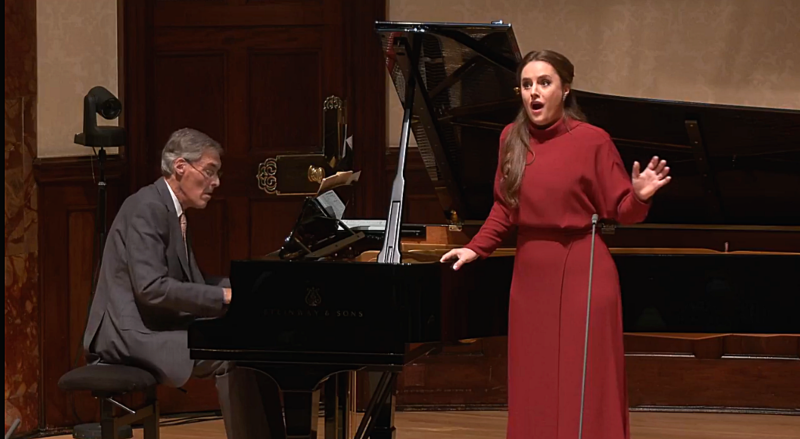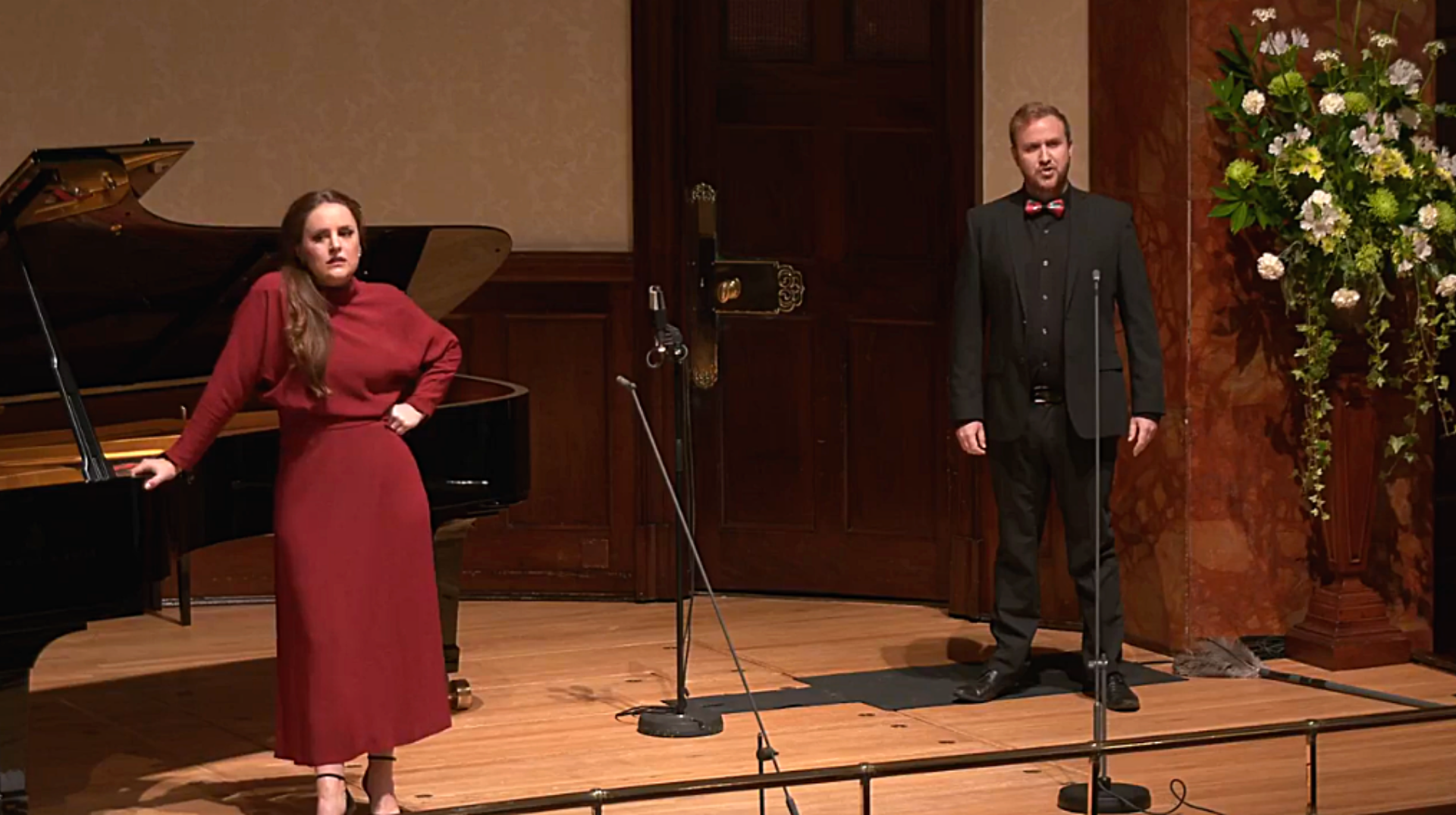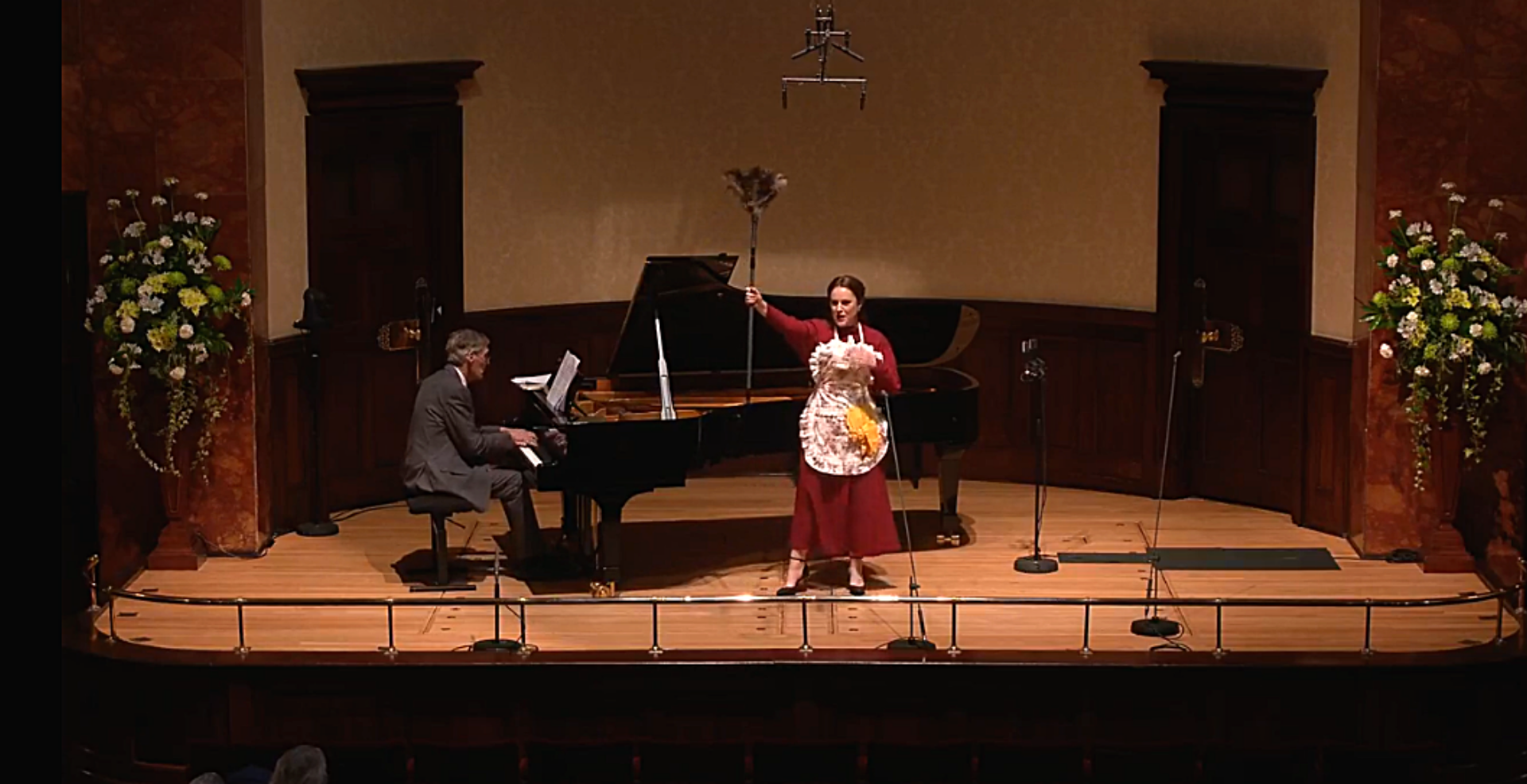Louise Alder, Roger Vignoles, Wigmore Hall review - German Romanticism meets French eroticism | reviews, news & interviews
Louise Alder, Roger Vignoles, Wigmore Hall review - German Romanticism meets French eroticism
Louise Alder, Roger Vignoles, Wigmore Hall review - German Romanticism meets French eroticism
Music by Berg, Bizet and Poulenc makes for a heady lunchtime amuse-bouche

We may have started out among the wholesome pleasures of nature, but we ended up in the bedroom – once, that is, we had recovered from the flying breasts… Soprano Louise Alder’s recital – the last in the Wigmore Hall’s month-long lunchtime series – had a twinkle in its eye and the weekend firmly in its sights.
Alder’s piquant, text-driven delivery is married to an increasing depth of tone, giving us a wonderful range of colours and characters through this brief programme. The chaste rapture of Fanny Mendelssohn’s mountain-top musings in “Bergeslust” was captured in silvery brilliance, Alder’s lofty soprano freewheeling above Roger Vignoles’ anchoring accompaniment, before delicacy was cast to the wind in the operatic ecstasy of “Nach Suden”.
Berg’s Seven Early Songs – love-songs for the composer’s new wife – cast off into moodier landscapes, Vignoles delighting in the crepuscular, Debussyean shades of the “vast wonderland” of “Nacht” and the gleam of moon on the water in “Schilflied”. Painting with her consonants, careful as a cabaret artist of every flick and curl of language, Alder embraced the sensuality of these youthful settings, the late Romantic swell and ebb of the phrases. The trippy “Traumgekrönt”, with its groping harmonies, pointed to the future, tempering the nostalgic kitsch of domestic miniature “Im Zimmer”. From Vienna to Paris and from married love to something rather more illicit. After the richness of the Berg, Bizet’s sweet-sour, perfumed seductions had a delightfully acid tang. The well-practised lovers of his “Chant d’amour” found a “favourable shade” that was more palm-court than woodland, while the awkward would-be lover of “La cocinelle” who, distracted by a ladybird, fails to steal a kiss, was painted with just the right balance of cruelty (Vignoles’ stammering splash of an opening and his staggering waltz offering a vivid picture of gangling awkwardness). And there was no doubting the intent of the poet of “Ouvre ton coeur” in Alder’s swaggering delivery, begging his lover to open her heart to persistent bolero rhythms, while clearly hoping she’d open something else instead – a prelude to the absolute sexual surrender of Satie’s “Je te veux” which closed the programme.
From Vienna to Paris and from married love to something rather more illicit. After the richness of the Berg, Bizet’s sweet-sour, perfumed seductions had a delightfully acid tang. The well-practised lovers of his “Chant d’amour” found a “favourable shade” that was more palm-court than woodland, while the awkward would-be lover of “La cocinelle” who, distracted by a ladybird, fails to steal a kiss, was painted with just the right balance of cruelty (Vignoles’ stammering splash of an opening and his staggering waltz offering a vivid picture of gangling awkwardness). And there was no doubting the intent of the poet of “Ouvre ton coeur” in Alder’s swaggering delivery, begging his lover to open her heart to persistent bolero rhythms, while clearly hoping she’d open something else instead – a prelude to the absolute sexual surrender of Satie’s “Je te veux” which closed the programme.
Three short songs from Poulenc’s Metamorphoses were all throwaway brilliance – a curtain-raiser for the most dramatic metamorphosis of all: Thérèse’s transformation from submissive French housewife to soldier-adventurer Tiresias in the composer’s one-act surrealist opera Les Mamelles de Tiresias. Returning from offstage complete with ruffled pinny, mop and duster, Alder gave us a fiery “Non, Monsieur, mon mari” (complete with interjections from Momentum scheme baritone Julien van Mellaerts as Thérèse’s startled husband) dispatching the aria’s uncompromising leaps and shifts of mood with the same insouciant ease with which she released her helium-filled balloon “breasts” up into the air. They’re probably still floating somewhere near the ceiling; they’re not the only ones.
Returning from offstage complete with ruffled pinny, mop and duster, Alder gave us a fiery “Non, Monsieur, mon mari” (complete with interjections from Momentum scheme baritone Julien van Mellaerts as Thérèse’s startled husband) dispatching the aria’s uncompromising leaps and shifts of mood with the same insouciant ease with which she released her helium-filled balloon “breasts” up into the air. They’re probably still floating somewhere near the ceiling; they’re not the only ones.
rating
Explore topics
Share this article
The future of Arts Journalism
You can stop theartsdesk.com closing!
We urgently need financing to survive. Our fundraising drive has thus far raised £49,000 but we need to reach £100,000 or we will be forced to close. Please contribute here: https://gofund.me/c3f6033d
And if you can forward this information to anyone who might assist, we’d be grateful.

Subscribe to theartsdesk.com
Thank you for continuing to read our work on theartsdesk.com. For unlimited access to every article in its entirety, including our archive of more than 15,000 pieces, we're asking for £5 per month or £40 per year. We feel it's a very good deal, and hope you do too.
To take a subscription now simply click here.
And if you're looking for that extra gift for a friend or family member, why not treat them to a theartsdesk.com gift subscription?
more Classical music
 Robin Holloway: Music's Odyssey review - lessons in composition
Broad and idiosyncratic survey of classical music is insightful but slightly indigestible
Robin Holloway: Music's Odyssey review - lessons in composition
Broad and idiosyncratic survey of classical music is insightful but slightly indigestible
 Classical CDs: Wolf-pelts, clowns and social realism
British ballet scores, 19th century cello works and contemporary piano etudes
Classical CDs: Wolf-pelts, clowns and social realism
British ballet scores, 19th century cello works and contemporary piano etudes
 Bizet in 150th anniversary year: rich and rare French offerings from Palazzetto Bru Zane
Specialists in French romantic music unveil a treasure trove both live and on disc
Bizet in 150th anniversary year: rich and rare French offerings from Palazzetto Bru Zane
Specialists in French romantic music unveil a treasure trove both live and on disc
 Scottish Chamber Orchestra, Ibragimova, Queen’s Hall, Edinburgh review - rarities, novelties and drumrolls
A pity the SCO didn't pick a better showcase for a shining guest artist
Scottish Chamber Orchestra, Ibragimova, Queen’s Hall, Edinburgh review - rarities, novelties and drumrolls
A pity the SCO didn't pick a better showcase for a shining guest artist
 Kilsby, Parkes, Sinfonia of London, Wilson, Barbican review - string things zing and sing in expert hands
British masterpieces for strings plus other-worldly tenor and horn - and a muscular rarity
Kilsby, Parkes, Sinfonia of London, Wilson, Barbican review - string things zing and sing in expert hands
British masterpieces for strings plus other-worldly tenor and horn - and a muscular rarity
 From Historical to Hip-Hop, Classically Black Music Festival, Kings Place review - a cluster of impressive stars for the future
From quasi-Mozartian elegance to the gritty humour of a kitchen inspection
From Historical to Hip-Hop, Classically Black Music Festival, Kings Place review - a cluster of impressive stars for the future
From quasi-Mozartian elegance to the gritty humour of a kitchen inspection
 Shibe, LSO, Adès, Barbican review - gaudy and glorious new music alongside serene Sibelius
Adès’s passion makes persuasive case for the music he loves, both new and old
Shibe, LSO, Adès, Barbican review - gaudy and glorious new music alongside serene Sibelius
Adès’s passion makes persuasive case for the music he loves, both new and old
 Anja Mittermüller, Richard Fu, Wigmore Hall review - a glorious hall debut
The Austrian mezzo shines - at the age of 22
Anja Mittermüller, Richard Fu, Wigmore Hall review - a glorious hall debut
The Austrian mezzo shines - at the age of 22
 First Person: clarinettist Oliver Pashley on the new horizons of The Hermes Experiment's latest album
Compositions by members of this unusual quartet feature for the first time
First Person: clarinettist Oliver Pashley on the new horizons of The Hermes Experiment's latest album
Compositions by members of this unusual quartet feature for the first time
 Gesualdo Passione, Les Arts Florissants, Amala Dior Company, Barbican review - inspired collaboration excavates the music's humanity
At times it was like watching an anarchic religious procession
Gesualdo Passione, Les Arts Florissants, Amala Dior Company, Barbican review - inspired collaboration excavates the music's humanity
At times it was like watching an anarchic religious procession
 Classical CDs: Camels, concrete and cabaret
An influential American composer's 90th birthday box, plus British piano concertos and a father-and-son duo
Classical CDs: Camels, concrete and cabaret
An influential American composer's 90th birthday box, plus British piano concertos and a father-and-son duo
 Cockerham, Manchester Camerata, Sheen, Martin Harris Centre, Manchester review - re-enacting the dawn of modernism
Two UK premieres added to three miniatures from a seminal event of January 1914
Cockerham, Manchester Camerata, Sheen, Martin Harris Centre, Manchester review - re-enacting the dawn of modernism
Two UK premieres added to three miniatures from a seminal event of January 1914

Add comment